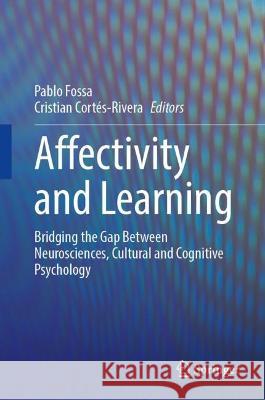Affectivity and Learning: Bridging the Gap Between Neurosciences, Cultural and Cognitive Psychology » książka
Affectivity and Learning: Bridging the Gap Between Neurosciences, Cultural and Cognitive Psychology
ISBN-13: 9783031317088 / Angielski
Affectivity and Learning: Bridging the Gap Between Neurosciences, Cultural and Cognitive Psychology
ISBN-13: 9783031317088 / Angielski
(netto: 930,71 VAT: 5%)
Najniższa cena z 30 dni: 963,86 zł
ok. 20 dni roboczych.
Darmowa dostawa!
This book presents an interdisciplinary approach to the study of affectivity and human learning by bridging the gap between neuroscience, cultural and cognitive psychology. It brings together studies that go beyond the focus on cognitive-intellectual variables involved in learning processes and incorporate the study of the role played by affectivity and emotions in learning not only at educational settings but in all processes of transformation and human development, thus presenting affectivity as a catalyst and mediator of all daily learning processes.Chapters brought together in this contributed volume present both theoretical contributions and results of empirical research from different disciplines, such as neuroscience, cognitive psychology, cultural psychology, educational psychology, developmental psychology and philosophy, and are grouped into five thematic sections. The first part of the book brings together chapters discussing different aspects of the role played by affectivity in learning processes from the perspectives of cultural, educational and developmental psychology. The second part is dedicated to the role of affectivity for teachers during their training as educators and during their pedagogical practice in diverse contexts. The third part focuses on the relationship between affectivity and learning from a neuroscientific point of view. The fourth part discusses affectivity and learning in therapeutic and clinical contexts. Finally, the fifth part brings together chapters about affectivity and learning in everyday life.By bringing together this rich interdisciplinary collection of studies,Affectivity and Learning: Bridging the Gap Between Neurosciences, Cultural and Cognitive Psychologywill be a valuable resource for researchers in the fields of psychology, neuroscience and education, as well as for educators and teachers interested in knowing more about the relationship between affectivity and human learning.
This book presents an interdisciplinary approach to the study of affectivity and human learning by bridging the gap between neuroscience, cultural and cognitive psychology. It brings together studies that go beyond the focus on cognitive-intellectual variables involved in learning processes and incorporate the study of the role played by affectivity and emotions in learning not only at educational settings but in all processes of transformation and human development, thus presenting affectivity as a catalyst and mediator of all daily learning processes.Chapters brought together in this contributed volume present both theoretical contributions and results of empirical research from different disciplines, such as neuroscience, cognitive psychology, cultural psychology, educational psychology, developmental psychology and philosophy, and are grouped into five thematic sections. The first part of the book brings together chapters discussing different aspects of the role played by affectivity in learning processes from the perspectives of cultural, educational and developmental psychology. The second part is dedicated to the role of affectivity for teachers during their training as educators and during their pedagogical practice in diverse contexts. The third part focuses on the relationship between affectivity and learning from a neuroscientific point of view. The fourth part discusses affectivity and learning in therapeutic and clinical contexts. Finally, the fifth part brings together chapters about affectivity and learning in everyday life.By bringing together this rich interdisciplinary collection of studies, Affectivity and Learning: Bridging the Gap Between Neurosciences, Cultural and Cognitive Psychology will be a valuable resource for researchers in the fields of psychology, neuroscience and education, as well as for educators and teachers interested in knowing more about the relationship between affectivity and human learning.











